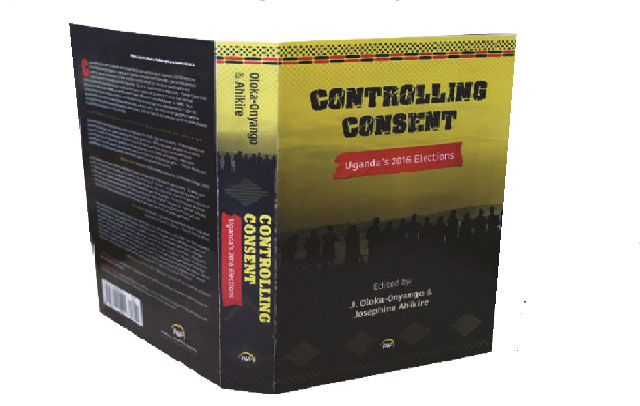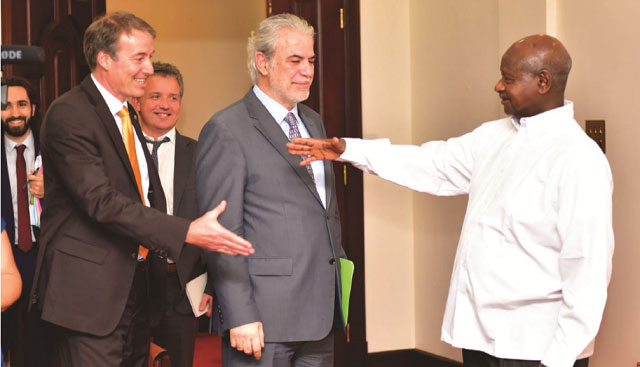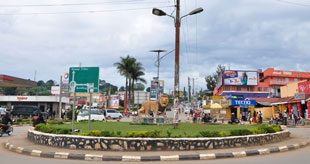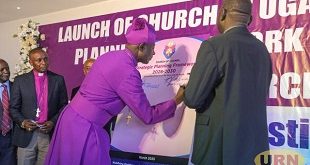
Uganda Government has seized copies of the book “Controlling Consent” by Centre for Basic Research (CBR) for what it called false declaration. The authors are accused of having falsely declared that the book is an education book when it is a political book.
The book, edited by Makerere Law Professor J Oloka-Onyango and Dr. Josephine Ahikire from the School of Women and Gender Studies, was published in the aftermath of the controversial 2016 general election won by President Yoweri Museveni. (click to read The Independent review of the book)
“Scandalous!! The book – ‘Controlling Consent’ on Uganda’s 2016 elections – has been seized,” tweeted Dr Busingye Kabumba also from Makerere University. He went on to explain that they were told “CBR made a ‘false declaration’ to the effect that the book was ‘educational’ when it is in fact political.”
Centre for Basic Research were informed by customs that “take notice that your consignment of 668 books has been seized and is liable for forfeiture in accordance with the provisions of the East African Community Customs Management Act, on the following grounds: Section/Offence – 203 False declaration,”
The last time a book was banned and its copies seized was in 2010 when copies of the book, “The Correct Line? Uganda Under Museveni” by Olive Kobusingye were intercepted at Entebbe Airport.
A 2010 The Independent analysis of the the book The Correct Line? Uganda Under Museveni showed that it was an audit or diagnosis of Museveni’s Sowing the Mustard Seed. Most of the references it uses are derived from Sowing the Mustard Seed. It holds Museveni against his every promise in Sowing the Mustard Seed and concluded that his political accountability has fallen flat.
`Controlling Consent: Uganda’s 2016 Elections’
In the book, the academicians say cracks are developing in President Museveni’s relations with the West, citing a growing forcefulness in criticism from the donors and Museveni’s equally forceful response to them.
The academicians say a decision on removal of the presidential age limit and the changing geopolitical dynamics will determine the future of Museveni’s relationship with the West.
In their view, removal of the presidential age-limit is certain to jeopardise Uganda’s democratic progress. But, they say, it is unlikely to hurt the alliance between Museveni and the donors in any significant way.
For donors to withdraw their support altogether, Museveni would first have to become “more of a liability than an asset in pursuing their interests”, they say in the conclusion of their multi-themed book titled ‘Controlling Consent: Uganda’s 2016 Elections‘. The authors are mainly academics from Makerere University in Kampala.
Additionally, they would have to “grow too weary of his tactics of blackmail and find a suitable alternative “big man” in the region to replace him with”, notes part of the 540-page anthology, which inquires into the disputed 2016 general polls and what they portend for the future of Uganda.
“Over the last 30 years donors have developed a critical stake in the NRM regime from which they have found it difficult to disentangle,” the book notes in its introduction.
“While Museveni has over the years become more abusive, disdainful and even dismissive of them, the donors still believe that he is their best option to retain “peace and stability” in Uganda, as well as to play a crucial role on the issue of security and containing the terrorist threat in the wider Eastern Africa/Greater Horn region.

“Will the same considerations still apply as we move on to 2021…Will donors continue to back him even after (or rather, when) he lifts Article 102(b) from the Constitution?” that, the book says, is the million dollar question.
Uganda’s leading donors have, however, remained silent over nascent manoeuvres to remove age limit.
An official at the European Union (EU), the country’s top donor, said they could not comment on it in December.
But as the West has criticised him and sought to decrease direct support to Kampala, Museveni has sought and found new sources of aid from the likes of China, Russia and even North Korea.
As academicians see it, these have relieved Museveni of the burden to constantly reinvent himself to curry favour with Western donors, which he has done all of his three decades in power to date.
Museveni is ineligible to run again in 2021 unless Article 102(b) of the Constitution is amended.The Article states a person is not qualified for election as President unless he or she is not less than 35 years and not more than 75 years of age. Museveni will be 77 years old by the time of the next election.
According to Controlling Consent, removal of the presidential age limit is the only remaining hurdle in Museveni’s apparent bid for a life presidency.
“If age limits are removed from our Constitution – as they will eventually be – there is no way in which we can look forward to a deepening democracy in Uganda because it implies that the semi-accountable presidency we now have will be replaced with an imperial presidency with no possibility of peaceful change,” according to Prof. Joe Oloka-Onyango, the book’s co-editor.
****
editor@independent.co.ug
 The Independent Uganda: You get the Truth we Pay the Price
The Independent Uganda: You get the Truth we Pay the Price



